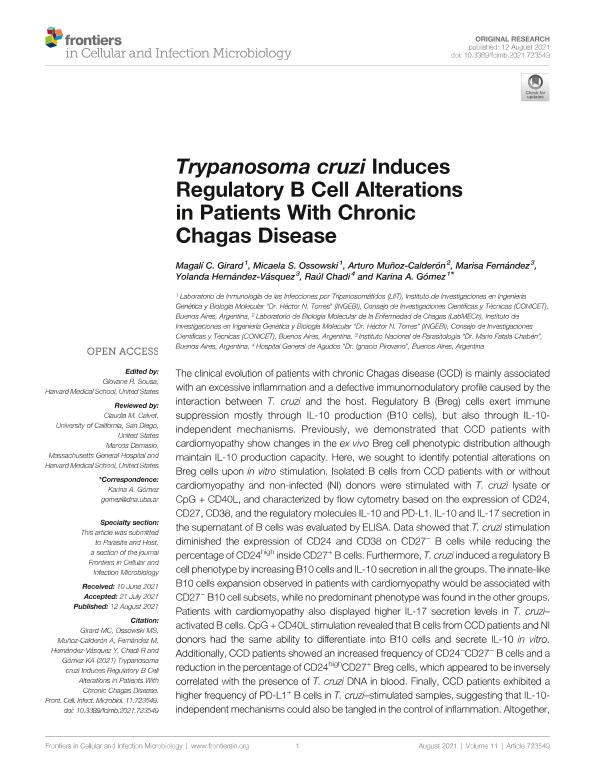Mostrar el registro sencillo del ítem
dc.contributor.author
Girard, Magalí Celeste

dc.contributor.author
Ossowski, Micaela Soledad

dc.contributor.author
Muñoz Calderon, Arturo Alejandro

dc.contributor.author
Fernández, Marisa
dc.contributor.author
Hernandez Vasquez, Yolanda Maria

dc.contributor.author
Chadi, Raúl
dc.contributor.author
Gomez, Karina Andrea

dc.date.available
2022-03-09T20:37:26Z
dc.date.issued
2021-08
dc.identifier.citation
Girard, Magalí Celeste; Ossowski, Micaela Soledad; Muñoz Calderon, Arturo Alejandro; Fernández, Marisa; Hernandez Vasquez, Yolanda Maria; et al.; Trypanosoma cruzi Induces Regulatory B Cell Alterations in Patients With Chronic Chagas Disease; Frontiers Media; Frontiers in Cellular and Infection Microbiology; 11; 723549; 8-2021; 1-15
dc.identifier.uri
http://hdl.handle.net/11336/153133
dc.description.abstract
The clinical evolution of patients with chronic Chagas disease (CCD) is mainly associated with an excessive inflammation and a defective immunomodulatory profile caused by the interaction between T. cruzi and the host. Regulatory B (Breg) cells exert immune suppression mostly through IL-10 production (B10 cells), but also through IL-10-independent mechanisms. Previously, we demonstrated that CCD patients with cardiomyopathy show changes in the ex vivo Breg cell phenotypic distribution although maintain IL-10 production capacity. Here, we sought to identify potential alterations on Breg cells upon in vitro stimulation. Isolated B cells from CCD patients with or without cardiomyopathy and non-infected (NI) donors were stimulated with T. cruzi lysate or CpG + CD40L, and characterized by flow cytometry based on the expression of CD24, CD27, CD38, and the regulatory molecules IL-10 and PD-L1. IL-10 and IL-17 secretion in the supernatant of B cells was evaluated by ELISA. Data showed that T. cruzi stimulation diminished the expression of CD24 and CD38 on CD27− B cells while reducing the percentage of CD24high inside CD27+ B cells. Furthermore, T. cruzi induced a regulatory B cell phenotype by increasing B10 cells and IL-10 secretion in all the groups. The innate-like B10 cells expansion observed in patients with cardiomyopathy would be associated with CD27− B10 cell subsets, while no predominant phenotype was found in the other groups. Patients with cardiomyopathy also displayed higher IL-17 secretion levels in T. cruzi–activated B cells. CpG + CD40L stimulation revealed that B cells from CCD patients and NI donors had the same ability to differentiate into B10 cells and secrete IL-10 in vitro. Additionally, CCD patients showed an increased frequency of CD24−CD27− B cells and a reduction in the percentage of CD24highCD27+ Breg cells, which appeared to be inversely correlated with the presence of T. cruzi DNA in blood. Finally, CCD patients exhibited a higher frequency of PD-L1+ B cells in T. cruzi–stimulated samples, suggesting that IL-10-independent mechanisms could also be tangled in the control of inflammation. Altogether, our results provide evidence about the potential role of Breg cells in the immune response developed against T. cruzi and its contribution to chronic Chagas cardiomyopathy.
dc.format
application/pdf
dc.language.iso
eng
dc.publisher
Frontiers Media

dc.rights
info:eu-repo/semantics/openAccess
dc.rights.uri
https://creativecommons.org/licenses/by-nc-sa/2.5/ar/
dc.subject
REGULATORY B CELLS,
dc.subject
IL-10-PRODUCING B CELLS
dc.subject
CHRONIC CHAGAS DISEASE,
dc.subject
HUMAN TRYPANOSOMA CRUZI INFECTION
dc.subject.classification
Bioquímica y Biología Molecular

dc.subject.classification
Ciencias Biológicas

dc.subject.classification
CIENCIAS NATURALES Y EXACTAS

dc.title
Trypanosoma cruzi Induces Regulatory B Cell Alterations in Patients With Chronic Chagas Disease
dc.type
info:eu-repo/semantics/article
dc.type
info:ar-repo/semantics/artículo
dc.type
info:eu-repo/semantics/publishedVersion
dc.date.updated
2021-12-13T18:52:20Z
dc.identifier.eissn
2235-2988
dc.journal.volume
11
dc.journal.number
723549
dc.journal.pagination
1-15
dc.journal.pais
Países Bajos

dc.description.fil
Fil: Girard, Magalí Celeste. Consejo Nacional de Investigaciones Científicas y Técnicas. Instituto de Investigaciones en Ingeniería Genética y Biología Molecular "Dr. Héctor N. Torres"; Argentina
dc.description.fil
Fil: Ossowski, Micaela Soledad. Consejo Nacional de Investigaciones Científicas y Técnicas. Instituto de Investigaciones en Ingeniería Genética y Biología Molecular "Dr. Héctor N. Torres"; Argentina
dc.description.fil
Fil: Muñoz Calderon, Arturo Alejandro. Consejo Nacional de Investigaciones Científicas y Técnicas. Instituto de Investigaciones en Ingeniería Genética y Biología Molecular "Dr. Héctor N. Torres"; Argentina
dc.description.fil
Fil: Fernández, Marisa. Instituto Nacional de Parasitología “Dr. Mario Fatala Chabén”; Argentina
dc.description.fil
Fil: Hernandez Vasquez, Yolanda Maria. Instituto Nacional de Parasitología Dr. Mario Fatala C; Argentina
dc.description.fil
Fil: Chadi, Raúl. Gobierno de la Ciudad Autónoma de Buenos Aires. Hospital General de Agudos Doctor Ignacio Pirovano; Argentina
dc.description.fil
Fil: Gomez, Karina Andrea. Consejo Nacional de Investigaciones Científicas y Técnicas. Instituto de Investigaciones en Ingeniería Genética y Biología Molecular "Dr. Héctor N. Torres"; Argentina
dc.journal.title
Frontiers in Cellular and Infection Microbiology
dc.relation.alternativeid
info:eu-repo/semantics/altIdentifier/url/https://www.frontiersin.org/articles/10.3389/fcimb.2021.723549/full
dc.relation.alternativeid
info:eu-repo/semantics/altIdentifier/doi/http://dx.doi.org/10.3389/fcimb.2021.723549
Archivos asociados
